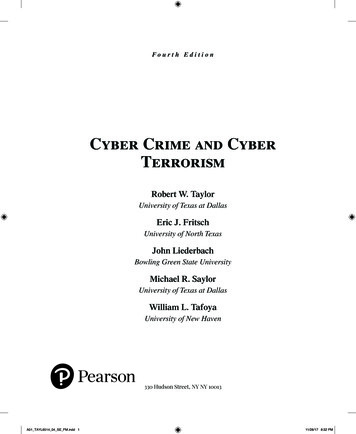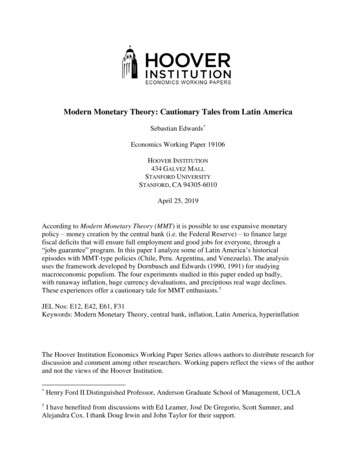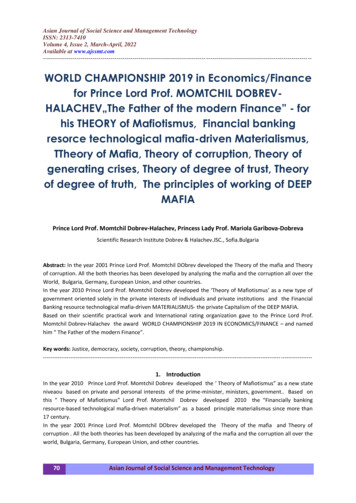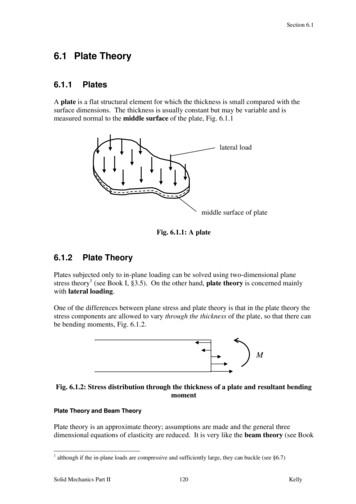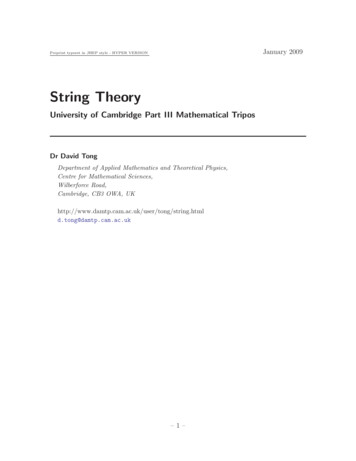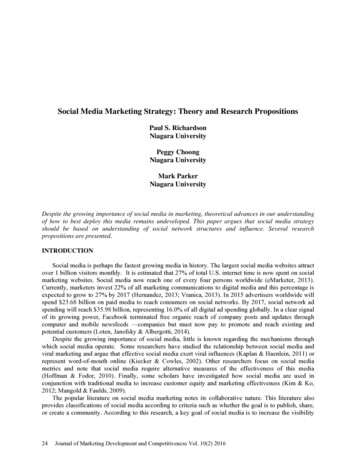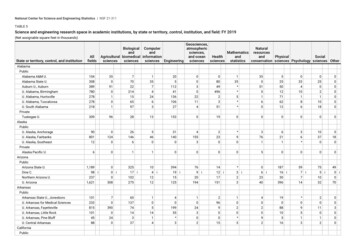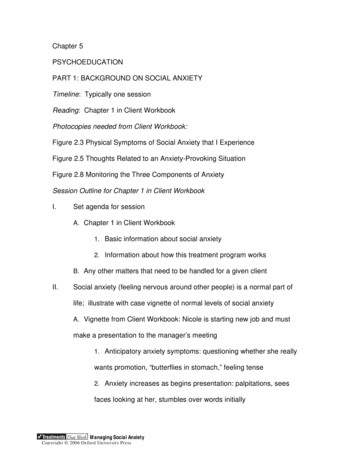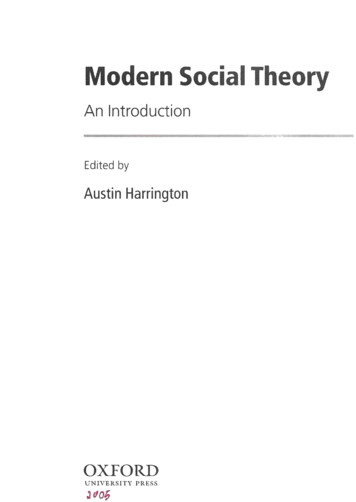
Transcription
Modern Social TheoryAn IntroductionEdited byAustin HarringtonOXFORDVNTVBRSTTY PRESS
Intrc -'--don.What isSocial Theory?Austin Harn'ngtonfOClCS DISCUSSED IN THIS INTIIODUCTIONThe rn anirlgd 'the6y' andsaialsdenoeMehddmedroddogyinsodalmeatchfaid thea yand'rommonse e*'Fads', '-,,4'W thewyandather afthewy * poMkalthcory W psydsloglrW t h e a y a n d t h c CondusibnQUESflOllS FOR DIXWYOIIGUrtIUl IWllnlR REAllnG Ik MCIA THEORVSOURCES HUTHE PUBLIC MEMAWB5IESbdal W r y canbedefined as the study of sdenWc ways ofthinldngabout sodal Uk. ItaKompassesideas about how societies change and develop, a b u t methods of explain9 social behavlour, about power and s o d structure, class, gender andethnldty.modernity and 'dvlliratlon', r e v o l u t l a n dutopias, and numerousother conceptsandprobierns in soda1 life. This Introduction addresses some of the leadhg questlorn t?lat&se when we start to think about the very idea of a 'science of society'. We begin by&cussing the meaning of the word 'theow and its oarlow implications for 'method'md 'methodology' in social research.We also consider questions about the relationshipd s d d theory to 'common sense', about the roIe of 'facts', 'values', and 'obfectivlty'InJociaI research, and about the relation of sociology to other disdplines of the sodalsciencesand the humanities such as political theory, psychology, anthropology,Mstory,.Ddphilosophy.
The meaning of 'theory'As a term of art, kocial theory' is a distinctly recent Invention. No such term exists InEnglish or in any other language before the twentieth centuryIand even io the twentiethcentury it is not common before about the 1940s. Auguste *Comtecoined the term sucioI0gie in France in the 1840s, but 'sociology' too did not gain widespread currency as a termuatll after 1900. However, the two separate words 'socfal*and 'theory' are very ancient inorigin. An initial lookat theix etymologieswillglw us somedues to theirmeanlag as a coniolned pair.Our words 'sodal*and 'society' derlve horn the Latin words sodus and sodeta. ForRomans, a sociw %a member of aadinj?partnership. Asocius was a merchant coomttnn with other merchants as a oartner, fellow, or 'associatet. A partnershipor 'association'between merchants was a sock&, which is the orinin of our modem U s h word 'company' or 'bushes finn', as well as our keyword society, The commercial meaainqaf soc dmcis directIy preservedin othermodem European Ianpages such as in the French and It2his sensw-.- .-. .heancic. eant'contem lation'.In thewritings of the philosopherM o t l e , &&a referredto contemplation of the cosmos. It contrasted withepm&, from which our word 'pra&eJderives.Praxisfor the Greeks referred to human -'wayof acttng and conductingtheirlives on this earth, in the Immediate everyday wodd. Clearly*this ancient Greek understanding of M a differs horn most common uses of the word 'theory' today. The Greekword thearla had g different set of connotationsfrom e m o d e r n linkages of theory with'scientific construction'. my we tend to think of 'a theoryr as belna a 'scientific construct' or a 'scientific model'. In contrast.thfor the Greeks did not itself mean science.-Rather, it meant rePection on science: reffection on the value of saence, as one mode of contem latin thecosmosamongothers-alongside art, myth,reliRfon.and the most generaldiscipline of thinkinp;that the Greeks called 'philoso hy ,or -ofwisdom'.The ancient Greek meaning of Mria might not seem partiadd9 relevant to us io thepresent day. It might seem to reinforce the rather widespread view that theory lacks relwan to dailylie. Yet t h i s wouldbe to fail to appreciatethe significance of theidea. 7?wiWfor the Greekswas an indispensableaid to maicing senseof their livesin the ordinaryworldof sodety, in the world of the 'city' or what they d l e d thepolis, born which our word 'politics' derives. Theybeueved that people who did not pause to engage in contemplation andreflection had no pointsof orientationfor conductinnt h e i r k s in vractice, in the politicalworld of actions and Interacttons with other people. Thus &&ria for the Greeks remainedindispensable to everyone who sought wisdom, happiness,and the good Me inthe realmofpFaxfs*It can be said that a renrrrent tendency af modernhas been for theory to beequated with scientific knowledgeper se and totation ofdE!critical reflective questioning about theand m e d n x of science-in the context ofG
politics. in thc c o n t c , a n f m o d e ofs understandlQ&bnd inthe context of theAnitudeand mortalitv of hm The neglect of thetiria in modern times was a partimlarIyimportant concern for the Jewish-C;erman philosopher Edmund *Husserl, founder of themwernent of philosophical t houghr known as *p!rmomenoEop. Writing in the 1930s,Husserl armed that unless the scicnces m t l t e theirdsources of origination and meanl n for evervdav life, in the "lifeworld' as hecalld it, they would be doomed to extinctiont Husscrl 19361.Either the sciences would become wholly abqorbed into the production oftechnnlogies of mastery over nature or they would dissolve in a wave of revolt against alltattonal thin king totdt roftrt.Unfortunately,the rise of fascism and militarism in Europe inrhe 1930s and 1940s confImed Hussert's fears, and the only remaining role for science inEuropean society in this period remained as an instrument in the production o l machinesof war and persecution,In a similar spirit, the Jewish-GermanCmlgre philosopher Hannah "Arendt argued thattheory In the modern age comes to be Inaeasinglv suhrdfnated to the search for technolofiical mntrol over physical and social lifc (Arendt 1958). Writing in the 19505, Arendtsuggested that where the original virn confmplativn or "contemplative life'oof the ancientGrreks had been intimately hnund up with what the Greeks saw as the vita actiw or 'activelife' of public palitical participation, the 'actlve lifekf the modern age no longer has thesense of practice and deliberation informed by contemplativereflection, Instead. modernconsciousness the w& becomes inmasinpllv oriented to w o ! and e v l t- v. ,where science scrves the develoament of technotop and where t k q d M a n d s o h vscrve a t mast as 'handmaidens' to science. In contrast, Arendt wanted to see a world inwhich t h o r yand philosophy not only assist science but also remind sdence Q itsmoraland nolittcal reswnsibilities. in the face of the fraatliy of the earth's resources and themortality of human lift,Science and social scienceThis ancient context of theilria suggests clrles for ways of thinking about the relationshipof soclal theory to science todav. li sndal&the of tthinkmg aboutsociety scientifically,we can also sav that it S a way of t h.l n l.u n p o u t how Zar it is possiblestudv m-1 .We can sav t h a t ? is athinking aboutwhat science and bei in 5scl ntificheanwith respect to the social world,'The ward ' i e n c cin' English has close connectionswith the natural sciences and is oftenused synonymouslywith them. HDW MI,the natural sciences are not theonlv disciplines of.human enquirywith a claim to the title of science. -aPeneraI toi s m a g & a m c t h o d m e t h o d s t o d consistently and tranrparently. Usuallv it involves an effort toh. .vbetween t5v tematic;lllvofthewrsonobserpingthem-whatwecall d a kIor 'cvidcncel--qad d e a m n r c - dby t h e - a s a d p r d e r i n g W W b o b s e r v e s . D e f i n e d in this general sense, it is clear t hat physics, chemistry,or biolop are not the only subjects of enquiry with a claim to the title of k i n g sciences.Other sub@ctsofstudp,such ashistory, archaeolo ,or an criticism, can aIsa be sciences. In
French, the subject5 known in English as the 'humanities' are called Ies sciences Aumnines,while in German the humanities are known as the *Gpistenvissmd ofim-'sciencesof themlnd', or "sciences of thc works of the human mind'.The particular association between scienceand natural science in English reflccls a seriesoldeveloprnents in ea lpmodern European history in which a number of precedents wereset by the emergence of physics and astronomy in the seventeenth centurv and the emergence of chemistry and biolo yin the eighteenth and nineteenth centuries. From aroundL k k A g h t e i e h t e e n t Y l r y . a variety of atternpfi were made toe thc -a-ddriuplins crenceswith d e w m l devotfd i d , h u m a n s o c i a l T l i e r ; ncludedeeconomics, phiiolugy and linwistics,history and art history, and notably 'sociology'.iL!&ashdh&LlW&W-P were Q& C P if ?t h y copied o -&sciences.Accordingto Auguste *Comte, who 1s thc originator both of our word 'sociology'and of the concept of *'positive science' or 'positivism, nnlv one f u m h m t a l p r i n c u&science and all p a c u l a rsciences had to be unified undcr this principle. I liisprinciple was set by the science of physics, which Comtc believed to proceed by QUEh v a n v c o n c t r n r i o n s-tfVhtually ali social theorists and philo ophersreject this nineteenth-century positlvistconceptJon of science todav. A l m n r t m l a v. . .s a n M L k h P h f mnf nl f h p n a l sri lvund--asclencesthcmselves.amuw h m w h i c h n w i r a s c i e n c e . - t h e humanities and thesocial sciences-dy V v a l u p 9 . ji f 5 . a n d bFnclalhphnvinllrantlin-dwa-hThese embodied meanings, wlucs, intentions, beliefs, and idcasas kxh aed. .are @rrsnfrnrlt Kt of rntmhnnal2awu%bt. . .mu am Thereforeermra-lr.cannat hepfYLulhpflnhvsrcalelemcntsarerrcatcddAlthough natural scicntistsalsu, up to a point,deal 7 1 tsymhol chconwithtructs that require *Anterprctivc skills of variou kinds, udaiktk. . . . .M Y I l f p r . v h ' " c h P m if pp nf. ."m xiwinidwinlhlPa&ra . . am-pThis question of differences between the human sciences and the natunl sciences raisesa more general question about t h e role of what is called 'method'and 'methodology' insocial research.I t is to this that we n w turn.Method and methodology in social research. I 1s. ta k N c t r m a t l r i a a n l r t * t l i t n f f i w T a b 'mghadrcalmPt to use mmeoarticulartwhniaue or techniques in b v s n m e Lhh& In social science we speak of 'quatitativc methods', such as a programme of interviews, and of 'quantitative methods', such as the use of s t a t i s t i c r . U h a x e a . .mfPllflwafo&&f m a s.kn
topic of study. Methodology thus refers to a theoretical principle or principles governinghe application of a set of methods. The '-ology'in 'methodoEogyJ refers to a themy ofmethodical practice.The central issue for any group of researcherswho want to think about the rnethdologygftheir research project concerns the relationshtp between the pieces of evidenceor data at:heir disposal and the theories governing thc way In which they apply methods in order to?:oduce and analyw this evidence or data. Here the word 'theory' is used in its more mode md familiar sense of "scientific model' or 'scientific construction'. TWQ very general ? basicd questions we can ask in this mnnectlon are the Following. What would research3e like if it consisted only of acts of data collection and no theories? And conversely, what-* uldresearch be like if it consisted only of theones find do data collection?Let us look at the second question first. If research consisted mIy of theories, it would Iack 2 r e n c toe the real world. Researchers would have no reason to g o out into the field andrxeniew people or analyse sources. If research consisted only of constructions in the a q i n a t i u n sof researchers, it would be empty of content; and it would be incapabEe of ng validated or tested in any way. Any piece of speculationwouId have to be deemed as: x d as another.'3ut now let us look at the first question. If research consisted mty of data colldm, it-2uld lack all order and sense.It research conristed only of heaps of information,it would?e no more than a chaotic bundle of statements, impossible to decipher or evaIuate or to:?I!to any meaningful purpose. It would be useless and pointless.'-1-e can conclude from this that theory is impossfbEe without *empirical obsetvation,1-d equally that empirical observation i s impossible without theory To paraphrase a' z oustatementsin the thought of the cighteenth-centurg Enlightenmentphilosapher'?manuel *Kant, we can say that theories without data me empty; data withwt theories mer'-.rLi(Kant ortginalEy wrote: 'Concepts without perceptions are empty; perceptions with-2: concepts are blind') (Kant 1781: edition B,pafa. 76).L? reality, it ncvec happens that a researcher's theoretical reflections entirely lack i r icontentc a l or that a researcher's empirical observations entirely Iack thmretical:rnstmctlon, In every aaua! Instance of research, a researcher's theoretical reflections arer r d e dtowards flndlng out some piece of evidence about an object of experience, and1 r5earchct1s observations of this object are always structured by his w her theoretical ?ections.We can say that thearies ought not to dictate or dogmatically constrain a-searcher? field of observations; but we have te accept that theoretical thinking of some-.' altvays underlies the researcher'sobservations.Il?eorbfcal thinking supplies criteria for selections and discriminations of things that:? eye Investigation, and It is the only way in which researchers can produce orderedI-: rclun ts and evaluations of their data. Thus theoretical thought i s always presupposed in- rch; there arc no observations that are not 'theory-laden'. There is no such thing7; ?ure observation or pure recepoon of data At a most basic leveI, theoretical thought-" :s impIvto any ordinary person's mental ordering of his or her sense-impressions in?-?n-day life.?-e key Implication of this connection between theoretical thought and ordinary--?-daythought is that social theory relates in an important way to what Is calledr - --.Ton sense'.
Social theory and 'common sense'Social theory is trained reflection on wavs of knowing social life. But It IS&IVthis, and1 t W k g h s purely as trained reflection. Social t t eoryarisesfitst and foremost fromeverv lavlife.suvariety of contexts of convcrsation.dlscussinn. and Inter-action between ordinary pcople. These are the samc contexts that lead to the formation ofsuch things as sodaf movements, political parties, trade unions, and arganized massfrom these contexls and isactions such as strikes and revoluttons. Soctal theoryfoteflectiveedispdlspaand that d o r n l n a t e m r n. .munlcattanaboutsocial and pW issue%.It Is Wf a s o c i a E with a multitudedeveryday contexts of uigi ationThe Italian Marxist writer Antonio Grarnscionce wrote that every otdinaryperson is, inprinciple, a theorist. Writing under lrnprksonment hy the Italian fascist regime in the 1920sand 19305,Gramscl wrote that 'everyone is a ph tlosopher' (Grarnsci 1926-37: 323),Grarnsdmeant t ha&ocial iKeoty3 n o r n e t h i n E % a f o rexpcrts. ocial theory is, and oughttobe, the orga lic-cutthnclonr)t \ o r n cic.t ntc\II n w l i r.vhr r y nrdlnaryperson has a say anda capacity to contribute-and in the cases where it c c a w to be the organic extension ofsuch debates, it loses touch with Its roots and is not wo thyof Its name. Gramsd's remarkhas its origins in the ideas of the nlnetccnth-century German philosopher G,W. F. *Hcgel,who exercised a major influence on the early Karl 'Marx. He elheld that all phiIosophydevelops progressively out af ordinary cvcryday consciousness, by a process of reflectionon lived experience. A further source of inspiration for Grarnsci was the elghteenthcentury Italian historical philosopher Giambattlsta *Vim, who argued that all humanbeings haw a capacity for understanding history because human beings mnke hlstory. Vicoheld that whereGod made nature, man alonemakes history, and that it Is man's makingothistory which gives him his power to undvstand history. In thls sense we can say t h a t li%our act onand Darticipation in the social world that Is the source pf our Wty to n&knowledge of history and soda1 processes.It can be said that the onlv Important difference between social theory and commonsense is that mdaE theory seeks to svsternatl;? and clarify debate about goals and problemsof social life through welldefincd @and techniques nf analyris. Building oncommon sense. social thtosv tries tadraw distinoions betwccn different wavs nf reactingmsoclal life. I t tries to distinguish emotional and moral wavs of rcacting from Impartialreactions. I t o b s e r v a t i o n s Incontrast to preludices and stereo-es.and It tries to untanalc attitudes of detachment from attl tudes of pa-vestedainterest.In this sense, a thesisin social theory tries to do more than the typical lead article oreditorial of a tabloid newspaper. Bn the tabloid articlc, information, emotions, moraljudgements;,arid prescriptions for change are wrv frequently m i x 4 up together. Similarly.a thesis in social theory tries to distinwish itself from a part).-political manifesto or a stateideology or a nationaIlsl myth or an Interest-group platform, Although its motives ofinception are hquently overtly political, social theory differs from poliHcal activism inan important sense. while many schools &mid 7nnlitlcal. .the x h v. l.t v offand1nroblcms:ltlahourtlon
7environmental destruction, or sexism or racism remains a different activity from theactivity of campaigning for policies to abolish them. The two kinds of activity dependon each other in very real and practical ways; but they remain distinct from each other.Social theory is not activism and cannot be turned into activism; it depends on practiceand is guided by practice but is not the same as practice. This is at once its strength and itslimitation.To appreciate these ways in which social theory entails both an attitude ofinvolvement in social life and an attitude of detachment from social life, we need to turn nowto a range of issues bound up with the role of 'facts', 'values,' and 'objectivity' in socialscience.'Facts', 'values', and 'objectivity'On one level, all social science is a search for facts, for 'social facts'. The Latin root of ourword 'fact' means 'something made' or 'something done', from factum, the participle of theverb facere, 'to make'. In addition, our modern sense of the word 'fact' refers to any state ofaffairs that is real, definite, and incontrovertible.In these two senses of the word 'fact', it is a fact that six million Jews died in theHolocaust; and it is also a fact that ten thousand Palestinians died in the founding of thestate of Israel in 1948. What is important in these two historical facts is less the exactnumerical statistic than the fact that something real, definite, and incontrovertiblehappened and was made to happen by human agency. The Shoah and the Nakba (theevacuation of Palestine) are not legends, myths, or fantasies; they are facts. They did nothappen of their own accord or by the agency of supernatural forces or spirits; they weredone and made by real human actors acting in definite social-historical conditions whichcan be documented, observed, analysed, and interpreted.However, the problem of facts for social science is that facts only ever appear to us ladenwith values. The Shoah and the Nakba are significant to us from the standpoint of moraland political values: they stand out to us precisely because they are an affront to humanvalues. They concern us because they are events involving sufferings and crimes whichought not to have occurred. Here the difference between facts and values can be understood as the difference between the world as it is, or was, and the world as we would like itto be, or not to be. How the world is is one thing; how the world oughtto be, or how it mightbe made better, is another. One way of responding to the world is 'descriptive'; the otherway of responding is 'prescriptive'.But the problem for social science in the real world is that facts cannot be separated fromvalues. If we had no values, if we had no interest in value in the world, we would not beinterested in any particular facts. We would not be struck by any particular facts as callingout for attention and demanding investigation. Although we are generally able to distinguish statements that claim to 'describe' how the world is from statements that 'prescribe'how the world ought to be, we cannot extract facts from values in any pure way. We cannotput all our values to one side in order to observe the world purely as a set of facts, undistorted by our frames of perception and feeling about what is right and wrong with the
world. Social facts are meaningful to us only insofar they are value-laden, and we onlycome to be engaged with these facts insofar as we have values about how the world ought tobe or ought not to be.This explains why researchlnPfacts b s t always produces a diversity of pointsof vlew, wh vte c on r. n w . t hone another. Different social parties havedifferent and often conflicting values about how the world should be, and different partiesstruggle with one another for the most authoritative account of the events and issues ofthe day. In the case at hand, numerous accounts exist of the causes of the Holocaust, anda broad spectrum of contestedviews reign about the causes and consequences of the founding of the state of Israel. Social science therefore has to consider a diversity of accounts,which very frequently turn out to be backed up by different sets of reasons worthy ofconsideration in their own right. In conseauence. it is often verv difficult. if not imnossible. to s p e a k any one 'r .l p h t s w e r rn the studv of social affairs,This raises a profound problem. -searchis possible only from value-laden points ofview. how can r w c h be 'obiective'? How can there be agreement about the accuracv.e research?validitv. or insight of anv articular i e c ofThere are ways of answering this question which need not lead us to think that valueconflict is fatal for the possibility of validity in research. If facts cannot be separated fromvalues. tdoes not follow that evldence about social life cannot be collected. analvsed. andreted In -tand methodical ways, The events of the Holocaust and theNakba are both capable of being submitted to transparent techniques of scrutiny-forexample: techniques of analysing documents and statistics, interviewing of witnesses, andthe like-and although many different accounts of these events still remain, and are stillbound to remain, it does not follow that no valid knowledge can be established aboutthem. Furthermore, & imnossihilitv of sevarating facts from values does not mean thatr e s e a r c h e r s o t realisticallv aim to work out roceduresbv which disagreements can bed out W n a l l y debated, If I am able to show you m a r i v e at my position,. . reasoaq for & stenng to vou how I believe t w n s to accountb r the matter and if you are able to do the same. we at least have.which we can develon further through continued crlticds for discuscommunication.Value conflict neednot therefore entail that any statement by a party to adiscussion has to be deemed as good as another, or that no agreement or no mutual criticaldiscussion of any kind is possible. And it certainly does not follow that someone whodenies that the Holocaust or the Nakba tookplace maintains as valid a position as someonewho demonstrates that they did, by adducing evidence and methodically examining andexplaining this evidence.Objectivity therefore remains a realistic and rationally desirable goal for research. But itis important to emphasize that obiectivitv need not be seen as the onlv or ultimate ma1 oymotive of researcLDifferent schools of social theory take differing views about the purpose. .and relative importance of objectivity. Some schools view it m end -whileotherstend to view it as a means towards other. m e vractical en&-such as social justiceand *emancipation, or liberation from oppression. In general, schools thataresubordinate obiectivitv to the Dursuit of moral and nolitical ends of socialdescribed as havine a *normativeorientation of thoueht. The word 'normative' here refersto attitudes that give priority to the 'ought' above the 'is', to determining how the world7 .-a
should be made better, rather than solely to observing how it Is. W will encounter manyexamplesof such attitudes in the course of this book. nut it should be stressed that nurner.wst between the attitude of normative enaaaement on the one IJmidwavhand and thhattitude efobjerrtivedetachment on h-11Pchnrlls-he?*--r-ory tin factadvocate combinations of involvTm'cnt nd dc.tachrnc lt,ot both practical'moral-political dedication and scientific di\tnnce. \ral.it t h c ' c j r i rcrlt,llns rl \tlnct I rom;lolltical ,rcti\ icrri t i It I i s nnt a purt,ly d cl rere tcclaffair of reflection. As the Germantheorirt Norbem 'FIias (1983) counsclsjpurc inr-ol\*e&-n t T t F o u x a G n t wouldand moralistic; but pure dctaclirnent I\-ithrlut nvolvcmentwould bc pointlcrs'2nd meaningless.------Social theory and other domains of theoryI1.e haw now discussed a range of Issu swith a broad general relevance to all disciplinesof:he humanities and social sciences. These Issues are particularly prominent in sociology3nd social theory hut they are not, in principle, ones that on!ysocialtheoristsand sociolorists are concerned with, The remaining sections of this Introduction wiEI therefore try torrovldr some turthcr charaacrlzation of the specific subject matters that social theoristslooking at three main areas of overlap anddifference between social theory and other domains: First. social theory andpoliticnltheory:second, the relation of social t h e a topsycholw and third, the relation of social theory to;-larmnitl sdisciplines, such as anthropology,history, literav and art criticism,philosophy,2nd socloloflstsarc concerned with. We end by n theoto y.dSocial theory and political theory-.theory has a"robably thecousin nf social theorv is p o w t h e o Political.7nn-standing position in the history of Western thought, reaching back lot he writings of-he ancient Grcek philosophers, as well as the Roman statesmen, the Christian medievalrkeologians, and the political philosophers of early modern Europe. Political theory Is. . . .r e I a t e d m t h e p of i n s u - e f i n t r d a s m. . w- i :he just adminismation of law in civil affairs. or t h e o r -vi s &Q.- 5 e f a t h e r o t . o r -p . .' as it was known in the. .?oIitical theory tends to be concerned with questions of a more overtly normative:haracter than those most often addressed in social theory. 1t is typically concerned with:zestions such as: which systems of government best sponsor freedom, justice, and equalT in social lie? Or: when is obedience to a rwlin and whcnisabedicncc.".power iustificd,"-:? a ruling power not justificd?hn contrast, rnciai t h c n e tends to hc rnoran rertedi3s G w n d s n f p e o p l c whr, a5k suctr qut.\tion%first cnrnc to hcconst tutcdas'. ,'3: grnup?. n a t is, it I F more directl!. conc rnedw i t h ttlc \ouinl bttlni ic uror such- -175 and their structurerand dynan icqof organirntinn.'----:c L I I O L I I r31 \octal t t w o r y d c t , r t l3 111r)rt t c b r l t r L l lplace to political questions than?':?trs. Hannah Arendt is one writer w h o held that social thought has genuinc value only'I-I - -.I---7
I U t l questtonsdat the fomhmt of its agenda. Arendt e m p b s h d theQnifAanm of the a d m t GTeek vlm of man as a 'poIitid animal' (Arenclt 1958), Thephilosopher * M e w m t 'Man is bya politid admal' (Mstotle, The I'd&,c.335 sc,para l2S3al-3). A m d f s w d d n g s demonstmtethe mdnuhqimportanceofthewhen itideafnGreekth thath aremfunyhuman l ltllp a r t i n t h e W f e s , i n t h e @ t i c a l t t ' q d i t I dp d L (AndwmayalsonmtheandentGreelrmdhafl te-mindeddtlzenwhono interest in public poIitical a k h was -theodgh of our modem word tdiot'.)This insight remains a vld cmddemtiw br Eodal thmry, h p t k a general academIcdbkionofiaburbetween thetwo-.Sodal-fsnwUitisnot*ttapolitics.Social theory and psychologyA second disdpllne closely rated to d dtheory b psyrblogy. Tbe history d M a 1thwgbt &ows many examples of dose cooperation Mwem pqdmbgy and sodologyIn addidon, the sub-dfsdpline of psychoma@& bundid by SQmmd *Fmd has beenaperPartwsmmof Iufluenmsindl t h e h d e s a n d s o d a l s d e n c e s , a s b Qqm8 of this boDkButwemuat rocne tdiffemices sodologyaudpqrholom o g g Is matlyconcemedwith the emotional andbehavloufofindMduak,treated as 1 cmdittoned actors who respond to sensory stimuli from anenvhmnmt.awmkihdpline of pqrholqy is %midp@mIogf, concemeB wlth fndhidual behavIourin sodal situations, pqdology k geaedly lm well equipped to deal witb c o t f eofactorsandwith the meaningfulseEf tionisofthese mUectMtieslnm c culA hrrther key dffau ceIn thisis that unlike dology, pqthology rebinsc b e U n l s s w l t h t h e n a R u a ) i I p t o-Oneof t h c o * F r e n c h w d o l r edem nstratethahe d d k-which CWld not be q l a f n e d enby the methods of psychology@urkhelm 1895). Inhis famms study of suide, Dudhelm(1897)swght to show that the easonsforpeopletakiugthelrlivesmuldnotbreaerred pudytopsy&hgld states tnbdlvidwlpe oas,d a s aperson's f d i n g s o f o onr o l cstatesanecessarily depend m soddogltal faaors, to do w i t h the extent to whIch d a Irollectivitlespmide nsmmm of 'infor their crmsdtuent memkm D u k M m ' svlsi011ofsoclob8yisdisarssedatIngth Chapter2d boaL.
Social theory and the humanitiesWe have already mentioned several general comnonaHties between social theory andhumanities disciplines.It is now worth looking at some more specific areas of interaction.A first important area is an lrrcpZogy.Anthropology means literally the 'study of man'. As a discipline today,anthropologyusually encompasses the s
The meaning of 'theory' As a term of art, kocial theory' is a distinctly recent Invention.No such term exists In English or in any other language before the twentieth centuryI and even io the twentieth century it is not common before about the 1940s.Auguste *Comte coined the term sucioI0- gie in France in the 1840s, but 'sociology' too did not gain widespread currency as a term
